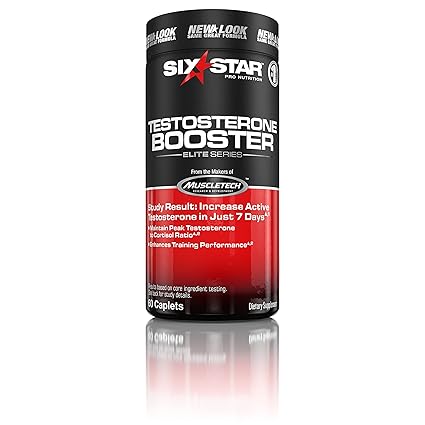Six Star Testosterone Booster Supplement, Extreme Strength, Enhances Training Performance, Scientifically Researched, Maintain Peak Testosterone, 60 Caplets
How to increase testosterone levels: 3 ways
Leafy salads, animal protein, nuts, seeds, legumes and dairy products - made a list of products that need to be added to your diet for the progress of natural testosterone production.
Testosterone is responsible for endurance, responsiveness, libido, and even improving cognitive abilities. The optimal level of hormone directly affects the quality of training and the level of sporting achievements. It is associated with a large amount of muscle mass and low fat content in the body. These indicators are of great importance in intensive training and generally affect the quality of life.
Natural testosterone production can be impaired due to negative external influences or an unhealthy lifestyle. Here is a brief list of things that can affect the normal functioning of the endocrine system:
extreme diets (“drying”) - low-calorie diets for the loss of adipose tissue and build muscle;
obesity;
alcohol use and smoking (active or passive);
stress;
environmental pollution (environmental problems).
Protecting yourself from these factors, you significantly enhance your health and improve hormonal levels. In addition, there is a simple and affordable way to increase the level of testosterone, simply by adding to your diet foods containing certain trace elements.
- Immediately I will say that it harms the production of a normal amount of testosterone. This fasting, lack of nutrition of full-fledged protein, such as veganism, and regular overeating, leading to obesity. Since testosterone is a steroid hormone, protein and cholesterol are necessary for its synthesis.
A protein of full composition (containing the entire range of amino acids, including essential ones - not synthesized in the body) is found in protein products of animal origin: meat, fish, poultry, seafood, eggs, by-products and dairy products. They contain the necessary cholesterol, from which both sex hormones and adrenal hormones are synthesized.
Accordingly, in order to produce enough testosterone, these foods must be included in the diet. The average consumption rate for a man of 19-50 years is three servings of meat or other protein foods per day (one serving is 75 grams of meat or fish or two eggs) and two servings of dairy products per day (one serving is 200 grams of yogurt, or 250 ml of cottage cheese, or 50 grams of cheese, or a glass of milk).
Obesity is just as harmful for testosterone as fasting, so it is better to use these products of lower fat content and do not forget to combine them with vegetables, fruits and cereal products.
It is important not to forget that regular (at least 30 minutes a day) exercise also helps to increase muscle mass, maintain normal body weight and heal the body.
Magnesium
Numerous studies on male groups, published in the Journal of Pharmaceutical and Biomedical Analysis, have shown that magnesium is positively associated with overall testosterone levels . Dietary nutrition often does not contain this important trace element in the right quantity, so most of the subjects experienced a shortage of it. Adding to the diet foods containing magnesium, gave a positive trend. It also turned out that testosterone levels of those who were actively involved in sports increased more intensely than those of those who lead a “sedentary lifestyle”.
Dietary sources of magnesium:
cereals - cereals, whole grain or bran bread;
dark green vegetables - spinach, broccoli, various greens, cabbage;
fish - salmon, halibut, tuna, pollock, mackerel;
nuts - almonds, cashews, peanuts, brazil nuts;
pumpkin, sunflower, flax seeds;
beans;
avocado;
bananas;
raisins.
Zinc
The positive effect of adding zinc to the diet showed various studies of the dynamics of the level of hormones that stimulate the production of testosterone.
Avoid zinc deficiency will help:
clams - oysters, crabs, shrimps;
meat - beef, pork;
dairy products - yellow cheese, yogurt, milk;
legumes;
oatmeal;
nuts - walnuts, pecans, pistachios, cashews, almonds;
pumpkin, sunflower, flax, chia seeds.
Vitamin K
One of the many functions of vitamin K in the body is to increase the level of activity of enzymes that synthesize testosterone.
Dietary sources of vitamin K:
egg yolk;
hard and soft cheeses;
fermented foods (sauerkraut, pickles);
oil (vegetable and animal);
fish fat.
To ensure the optimum level of testosterone, count the calorie of your diet so that it covers all energy costs (training, work, activity). Focus on leafy vegetables, animal protein, nuts, cereals, seeds, and dairy products.
9A-----------xx
